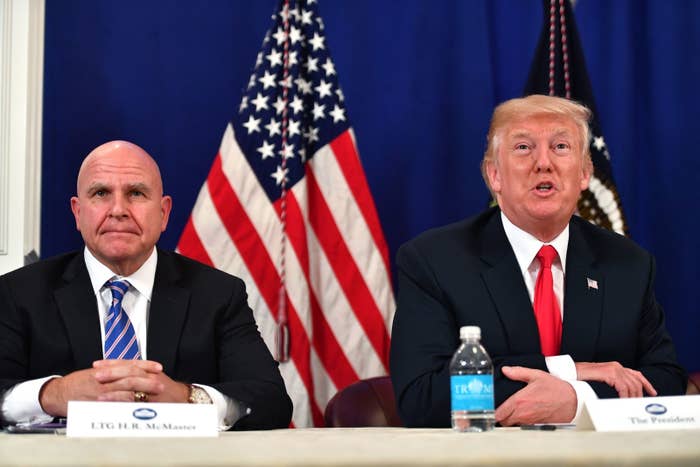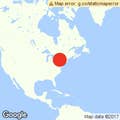
The top US national security official has directed government departments and agencies to warn employees across the entire federal government next week about the dangers and consequences of leaking even unclassified information.
The Trump administration has already promised an aggressive crackdown on anyone who leaks classified information. The latest move is a dramatic step that could greatly expand what type of leaks are under scrutiny and who will be scrutinized.
In the memo about leaks that was subsequently obtained by BuzzFeed News, National Security Adviser H.R. McMaster details a request that “every Federal Government department and agency” hold a one-hour training next week on “unauthorized disclosures” — of classified and certain unclassified information.
The request includes “[s]uggested training materials” — provided by the National Counterintelligence and Security Center — that include the 15-minute C-SPAN video of Attorney General Jeff Sessions’ August news conference about leaks and a six-minute Fox News video of an interview with the National Counterintelligence and Security Center’s director, William Evanina.
White House and National Security Council officials did not respond to requests for comment on the memo on Wednesday.
Last month, Sessions said his department was pursuing a number of leak investigations, and that the FBI had created a unit to deal with leaks of classified information. “We will not allow rogue anonymous sources with security clearances to sell out our country any longer,” he said in the August press conference.
The memo, dated Sept. 8, signals a potentially dramatic expansion of the previous administration’s war on leaks. The Obama administration moves focused on alleged national security leaks and “insider threats” — an effort centered around the intelligence agencies under an October 2011 executive order from President Obama. Those investigations — and in some cases, prosecutions — were widely criticized, particularly in the media.
McMaster’s memo is directed to a much larger group, including virtually every senior official in the federal government — from the vice president and cabinet heads to the chairman of the Joint Chiefs of Staff to the director of the Peace Corps. Perhaps more importantly, the memo asserts that “unauthorized disclosure” of both classified and “controlled unclassified” information “causes harm to our Nation and shakes the confidence of the American people.”
The McMaster memorandum itself likely would be seen as a type of such a “controlled unclassified” document, as it is marked: “UNCLASSIFIED//FOUO [For Official Use Only].”
The first year of the Trump administration has been characterized by leaks at all levels, a source of considerable public criticism from the president himself. Axios reported Sept. 10 that Sessions has suggested employing lie detector tests in at least one leak investigation.
In the memo, McMaster requests that every government department and agency “dedicate a 1-hour, organization-wide event to engage their workforce in a discussion on the importance of protecting classified and controlled unclassified information.” Although issued as a request, the memo later notes, “In order to ensure a consistent and strong message is given to the entire federal workforce, such training should occur the week of September 18-22, 2017.”
Planning is taking place to hold the trainings, one department confirmed Wednesday. Although a date has not yet been set, Education Department press secretary Liz Hill told BuzzFeed News, “The Department has received the White House Memorandum dated September 8 from General McMaster, and it intends to comply.”
While highlighting concerns regarding unauthorized disclosures of classified information, McMaster also writes regarding the trainings that “it is equally important to discuss the importance of protecting controlled unclassified and personally identifiable information from unauthorized public disclosure.”
In addition to the videos, which would constitute about one-third of the training time, the training draft schedule from the National Counterintelligence and Security Center includes discussion from “Department/Agency leads” on the differences between espionage, “unauthorized disclosures (of classified information),” “leaks (to the media),” hackers and whistleblowing. There also is to be a discussion of “[d]amage to national security, to the organization, to the American public,” “[p]enalties for unauthorized classified disclosures,” and “[a] specific case, if possible in this particular D[epartment]/A[gency].”
The full text of the memo:
Memorandum for the Vice President
The Secretary of State
The Secretary of the Treasury
The Secretary of Defense
The Attorney General
The Secretary of the Interior
The Secretary of Agriculture
The Secretary of Commerce
The Secretary of Labor
The Secretary of Health and Human Services
The Secretary of Housing and Urban Development
The Secretary of Transportation
The Secretary of Energy
The Secretary of Education
The Secretary of Veterans Affairs
The Secretary of Homeland Security
Administrator of the Environmental Protection Agency
Director of the Office of Management and Budget
United States Trade Representative
Representative of the United States of America to the United Nations
Chair of the Council of Economic Advisers
Administrator of the Small Business Administration
Assistant to the President and National Security Advisor
Director of National Intelligence
Assistant to the President for Science and Technology and Director of the Office of Science and Technology Policy
Assistant to the President for Economic Policy and Director of the National Economic Council
Assistant to the President for Homeland Security and Counterterrorism
Director of the National Drug Control Policy
Chair of the Council on Environmental Quality
Director of the National Counterrorism Center
Director of the Federal Bureau of Investigation
Chairman of the Board of Governors of the Federal Reserve System
President of the Export-Import Bank of the United States
Director of the Central Intelligence Agency
Administrator of the United States Agency for International Development
Chairman of the Joint Chiefs of Staff
Administrator of General Services
Administrator of the National Aeronautics and Space Administration
Director of the Office of Personnel Management
Administrator of the Federal Aviation Administration
Chair of the Nuclear Regulatory Commission
Director of the Peace Corps
Chief Executive Officer, Millennium Challenge Corporation
Director, White House Military Office
Director of the National Security Agency
Director of the Defense Intelligence Agency
Director of the Selective Service System
President of the Overseas Private Investment Corporation
Chair of the Federal Communications Commission
Executive Director of the President’s Intelligence Advisory Board
Director of the National Science Foundation
Administrator of Drug Enforcement
National Geospatial-Intelligence Agency
SUBJECT: Request for Provision of Training on Unauthorized Disclosures
The unauthorized disclosure of classified information or controlled unclassified United States Government information causes harm to our Nation and shakes the confidence of the American people. In this era of unprecedented unauthorized disclosures, it is important to take time to review with your workforce their roles and responsibilities in safeguarding United States Government information.
In light of the recent press conference by the Attorney General and the Director of National Intelligence regarding unauthorized disclosures, I am requesting that every Federal Government department and agency dedicate a 1-hour, organization-wide event to engage their workforce in a discussion on the importance of protecting classified and controlled unclassified information, and measures to prevent and detect unauthorized disclosures.
For those with access to classified information, a review of the non-disclosure agreement reminds us of the responsibilities that come with access to, and penalties for unauthorized disclosure of, classified information. However, it is equally important to discuss the importance of protecting controlled unclassified and personally identifiable information from unauthorized public disclosure.
Although there are policies and guidance already in place to prevent unauthorized disclosures, it will be time well spent to shine a spotlight on the importance of this issue, and engage the workforce in conversation about what it means to be a steward of United States Government information. It is particularly important to stress the sharp difference between unauthorized disclosures of information and whistleblowing — the responsibility of all federal employees to report waste, fraud and abuse through proper channels.
There are many resources available to frame this 1-hour event, including a review of policies, guidance, videos, and training materials, and perhaps most important, an open discussion to answer questions and raise issues to ensure that our safeguarding measures are understood and effective.
Suggested training materials are attached. In order to ensure a consistent and strong message is given to the entire federal workforce, such training should occur the week of September 18-22, 2017.
H.R. McMaster
Lieutenant General, United States Army
Assistant to the President for National Security Affairs
Molly Hensley-Clancy contributed reporting.
CORRECTION
The types of disclosures raised in the memorandum are "classified" and "controlled unclassified" information. An earlier version of this story included an incorrect reference to "uncontrolled unclassified" information.

